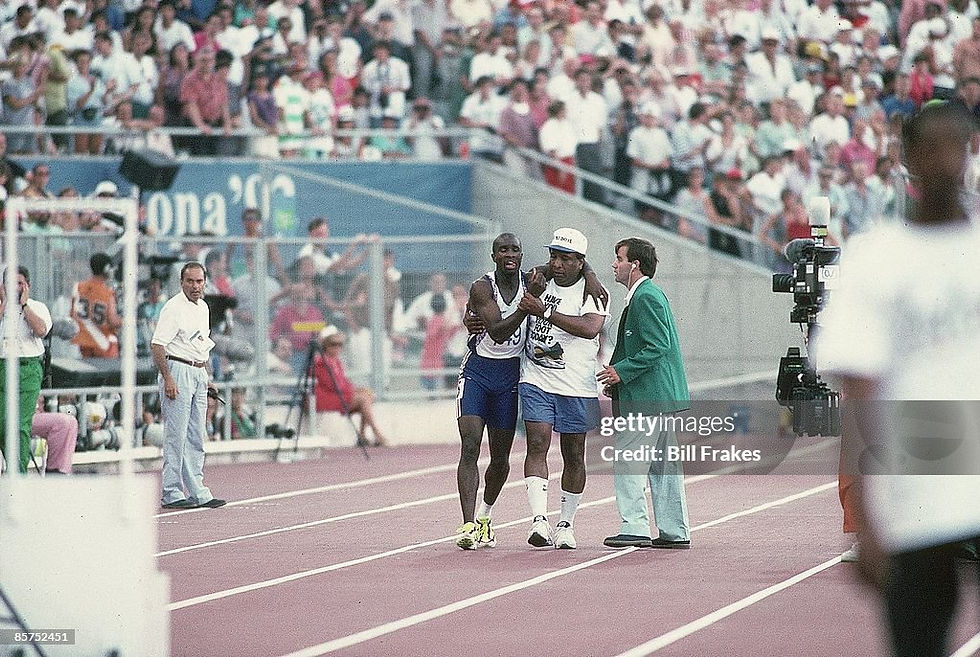A Triumph
- hydesollie
- Aug 5, 2024
- 3 min read
Updated: Aug 20, 2024
Paris.
The Athletics portion of a spectacular Olympic quadrennial kicks into high gear. The Men’s 100m final, for the first time ever, sees all eight competitors finish in under 10 seconds. Swede Mondo Duplantis, yet again, shatters the world record in the pole vault.
Still, for me at least, the best is yet to come. Partly due to the 400m race itself, a unique blend of speed, stamina and strategy. Of negotiating extreme fatigue, of delicately balancing aerobic and anaerobic energy systems.
But, primarily for one of the most inspirational scenes in Olympic history. 32 years ago, almost to the day.

1992. An early August evening in Barcelona.
British athlete Derek Redmond is in the form of his life. Overcoming a series of debilitating achilles tendon injuries, he breaks his country’s 400m record on two different occasions. Then is part of a 1991 World Championship relay team. His star in the ascendancy, tabbed as a co-favourite for a coveted Olympic gold medal.
The 400m event, in major meets, is brutally demanding. Four races over five days. Wrenching demands on muscles and lungs. Nonetheless, Redmond breezes through his first two heats, winning both, the first in a blistering 45.03.
The much-anticipated semi-final at the Estadi Olimpico duly gets underway. Redmond in lane 5. Well placed as the race moves into the back stretch. Moving smoothly, immediately recognizable in his white singlet, emblazoned with number 749, blue shorts and yellow spikes.

Suddenly, seemingly out of nowhere, disaster strikes. Passing the 250m mark, he hears a pop in his right hamstring. Clutching his leg, severely hobbled, he hops a few steps before sprawling to the track in agony. Cruelled by injury at the worst possible moment.
A stretcher is wheeled out, medical staff quickly on the scene. Yet, determined to finish the race, regardless of the crushing circumstances, Redmond waves them away.
Desperate and determined, he gets back to his feet. Limping awkwardly, his face a mask of pain and covered in tears, he wends his way around the bend. Approaches the final straightaway.
What follows is both excruciating and exhilarating.

From the top row of the grandstand, part of the sellout crowd of 65,000, Jim Redmond watches his son suffer. Rushing down flights of stairs, he jumps the guardrail, ignores the protestations of various security personnel. Soon catches up to his son on the track. Places one arm around his waist, the other grasping his left wrist.
In tandem for a few steps, Derek then stops. Leans on his father for support. Sobbing, he throws his arms around his father’s shoulders.
The capacity crowd watches. First in disbelief, then uncertain, next in full support, then finally contributing a full-blooded ovation. Waves of sound cascade around the stadium. Goosebumps, lumps in the throat. 65,000 witnesses to the Redmond’s collective spirit and courage.

The pair wobble towards the finish. As camera crews swarm, a green blazered race steward thinks better of interfering. A few steps from the end, Jim Redmond lets his son go, to cross the line alone. Then throws his arms around him once again. Defiant to the end.
Indeed, in this case, sport’s fascination and preoccupation with outcome, with actual winners and losers, is absolutely irrelevant. Medal counts be damned.
Not that it matters, but Derek Redmond officially is disqualified from the race, given the external assistance he receives. In Olympic records, next to his name sit the initials DNF – “Did Not Finish.” Somewhat ironic when so many people, athletes and fans alike, consider his actual finish one of the most memorable of all time.

Furthermore, one might note that, originally at least, Redmond is listed as having abandoned the race. Nothing could be farther from the truth.
Instead, what transpires is the absolute opposite. A brave athlete soldiers on after a disastrous fall. A father supports a son, without hesitation, under the most intense public glare and in heartbreaking circumstances, in a time of need.
In short, the chain of events in every way a triumph.
Editor’s note:
In recognition of his role in a famous Olympic moment, Jim Redmond acts as a torchbearer for the 2012 London Olympics.




Moving!